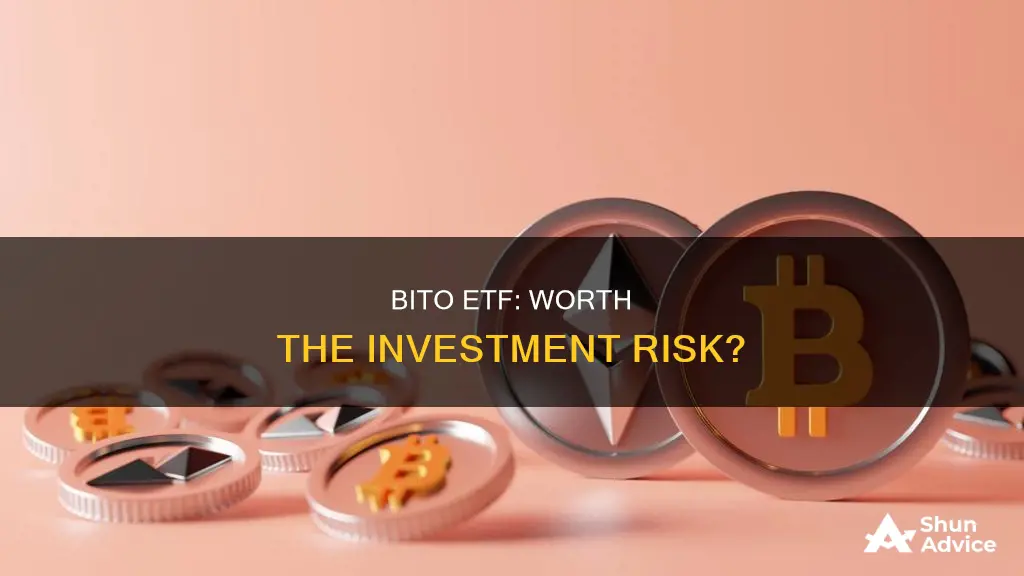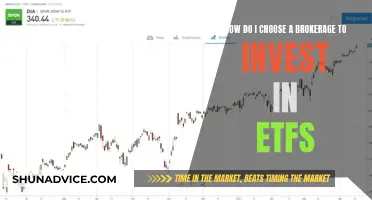
Investing in a Bitcoin ETF is a good option for traders who want to gain exposure to Bitcoin without the complexities and risks associated with direct investment. Bitcoin ETFs, or exchange-traded funds, are a more accessible and regulated way to invest in Bitcoin through traditional brokerage accounts. They offer advantages such as diversification, simplicity, and security, but it's important to consider the fees, volatility, and regulatory uncertainties associated with these investment vehicles. Before investing, it's always prudent to seek professional advice and thoroughly understand the risks involved.
| Characteristics | Values |
|---|---|
| Type of ETF | Crypto ETF, Bitcoin ETF, Bitcoin Futures ETF |
| Investment Objective | To produce returns that correspond to Bitcoin |
| Investment Type | Invests in Bitcoin futures, not Bitcoin itself |
| Brokerage Account | Can be bought through a brokerage account, no need for a cryptocurrency exchange account or wallet |
| Distribution | Pays a monthly distribution, typically with an ex-distribution date on the first trading day of the month |
| Dividend | Yes |
| Expense Ratio | 0.95% |
| Risk | High volatility, complex derivatives |
| Suitability | Investors who want exposure to Bitcoin futures prices, want to avoid self-custody and cryptocurrency exchanges, want to invest using a regular brokerage account, are comfortable with high volatility and complex derivatives, and seek a crypto-linked product that pays monthly income |
What You'll Learn

Pros and cons of investing in BITO
Pros of investing in BITO:
- It is the first U.S. Bitcoin-linked ETF, which has grown at a record speed, amassing over $1 billion in two days.
- BITO lets investors gain exposure to Bitcoin without needing to own it themselves.
- BITO is actively managed rather than tracking an index.
- BITO pays a monthly distribution, primarily from the profits it earns from managing Bitcoin futures contracts and the interest earned by its collateral.
- BITO is best suited for an investor who wants exposure to Bitcoin futures prices, prefers to avoid self-custody and cryptocurrency exchanges, wants to invest using a regular brokerage account, is comfortable with high volatility and complex derivatives, and seeks a crypto-linked product that pays monthly income.
Cons of investing in BITO:
- BITO does not hold Bitcoin directly. The fund aims to generally correspond to the performance of Bitcoin, which presents a risk as Bitcoin can be highly volatile.
- BITO carries an annual expense ratio of 0.95%. As other funds emerge with lower fees, money in BITO may flow elsewhere.
- BITO might not provide returns that directly track the underlying asset.
- There is a risk of the market being flooded with products providing the same service for less.
Vanguard ETF Minimum Investments: How Much to Invest?
You may want to see also

BITO's investment strategy
BITO, or the ProShares Bitcoin Strategy ETF, is the first U.S. bitcoin-linked ETF. It aims to produce returns that correspond to the performance of bitcoin. BITO does not invest directly in bitcoin but instead in bitcoin futures contracts.
BITO collects a 0.95% fee, or $95 on a $10,000 investment, for providing investors with access to bitcoin futures. This is a relatively low fee compared to other Bitcoin funds, such as the Grayscale Bitcoin Trust (GBTC), which charges 2.0% annually.
BITO is a passively managed ETF, meaning it tracks an index rather than being actively managed by fund managers. This means BITO's expenses are generally lower than those of actively managed funds.
BITO's strategy is to provide a straightforward, low-cost way for investors to gain exposure to bitcoin without having to invest directly in the cryptocurrency or use a cryptocurrency exchange account or wallet.
Saudi Arabia ETF: A Guide to Investing
You may want to see also

BITO's role in a client's portfolio
- Convenience and Accessibility: BITO, as a spot Bitcoin ETF, offers convenience and accessibility to investors who want exposure to Bitcoin. It lowers the barriers to entry into the crypto market by eliminating the need for investors to secure wallets, navigate crypto exchanges, or manage private and public keys. This simplicity makes it attractive, especially to those accustomed to traditional investments.
- Liquidity: BITO enhances liquidity in the Bitcoin market by making it easier to buy and sell Bitcoin through familiar brokerage accounts. This mirrors the process of trading traditional stocks or ETFs, providing an intuitive transition for mainstream investors.
- Regulatory Oversight: BITO, as a regulated investment product, provides investors with greater transparency and protection. When investing directly in Bitcoin, individuals may face less standardized regulations, whereas BITO is subject to rules that ensure transparency and investor protection.
- Tax Implications: In some jurisdictions, investing in BITO could offer tax benefits compared to holding cryptocurrencies directly. The tax treatment of ETFs is typically more straightforward and established, providing clarity to investors regarding their tax obligations.
- Diversification: BITO can contribute to portfolio diversification as Bitcoin is considered a unique asset class. Adding Bitcoin exposure through an ETF like BITO can be a more straightforward way to gain exposure to cryptocurrencies compared to buying and holding crypto directly.
- Professional Management: BITO is professionally managed, which can be advantageous for investors who do not have the time or expertise to actively manage their crypto investments.
- Potential Cost Savings: While BITO charges management fees or expense ratios, these costs may be offset by saving investors the time and expenses associated with exchanging and securing Bitcoins themselves.
Modeling an ETF Investment Plan: A Guide to Success
You may want to see also

BITO's historical performance
BITO, or the ProShares Bitcoin Strategy ETF, is a type of crypto ETF, or exchange-traded fund, that allows investors to gain exposure to cryptocurrencies through their regular brokerage accounts. Crypto ETFs, including BITO, were first approved by the SEC in January 2024.
As of September 2024, BITO's 1-year daily total return was 109.38%. Its 3-year daily total return was 0.00%. BITO's performance in the first quarter of 2024 was -17.17%, compared to -15.28% for its category.
BITO's performance is also reflected in its price. As of April 2023, BITO's price was $40.72. As of April 2024, its price was $39.67.
BITO's performance is also contextualised by the performance of the wider crypto market. Bitcoin's value plummeted by around 75% from late 2021 through 2022. However, since bottoming out at $16,000 in November 2022, Bitcoin has rebounded, passing the $70,000 mark for the first time in March 2024.
The crypto market's highs and lows have historically been driven by a range of factors, including significant news events, high interest rates, leaps in technology, and investor herd mentality.
Carbon Credits ETF: A Smart Investment Strategy
You may want to see also

BITO's fees and expenses
Management Fees
The management fees for BITO are not explicitly stated, however, crypto ETFs typically have expense ratios ranging from 0.39% to 1.5%, which is significantly higher than the transaction fees charged by crypto exchanges. These fees are paid to the brokerage firm that facilitates the ETF investment. It is important to consider these fees when comparing the costs of investing in a crypto ETF versus buying cryptocurrency directly.
Brokerage Commissions
When investing in BITO or any other ETF, investors are subject to brokerage commissions. These commissions are incurred when buying or selling ETF shares and can vary depending on the brokerage firm used. It is worth noting that some brokerage firms offer commission-free trading on stocks and ETFs, which can help reduce overall investment costs.
Fund Expenses
In addition to management fees and brokerage commissions, there are other fund expenses associated with BITO. These expenses include the costs of operating the fund, such as marketing, distribution, and administrative fees. While these expenses may not be directly charged to investors, they are typically reflected in the fund's expense ratio, impacting the overall return on investment.
Opportunity Costs
While not a direct fee or expense, opportunity costs are an important consideration when investing in BITO. By investing in a crypto ETF, investors give up the opportunity to invest directly in Bitcoin or other cryptocurrencies. This may limit their potential returns, especially if the ETF underperforms the underlying cryptocurrency market.
In summary, BITO's fees and expenses include management fees, brokerage commissions, and fund expenses. These costs can impact the overall return on investment and should be carefully considered before deciding to invest in BITO or any other crypto ETF. It is essential to review the fund's prospectus and fee schedule to fully understand all the associated fees and expenses.
Schwab's Auto-Invest Feature: A Smart ETF Strategy?
You may want to see also
Frequently asked questions
BITO is the ProShares Bitcoin Strategy ETF. It is a type of exchange-traded fund (ETF) that allows investors to gain exposure to Bitcoin without having to buy and store the tokens themselves. ETFs typically track the performance of one or more cryptocurrencies, providing investors with a convenient way to diversify their portfolios and benefit from the potential growth of this market.
Investing in BITO can offer several advantages, including diversification, simplicity, and security. Crypto ETFs provide a way to add crypto exposure to your investment portfolio and make it easier to gain exposure to multiple cryptocurrencies. They are also simpler to invest in, as you can buy shares in an ETF through your regular brokerage account, without the need to set up a crypto wallet or exchange. Additionally, with an ETF, you don't need to worry about storing your crypto securely, as the fund's custodian will handle that for you.
Investing in BITO is not without risk. The crypto market is highly volatile, with prices fluctuating significantly. There are also regulatory uncertainties, as the crypto market is still largely unregulated, and changes in regulations could impact the performance and availability of crypto ETFs. Additionally, crypto ETFs typically have higher fees than traditional equity ETFs, as they have to cover the costs of exchanging and securing the underlying cryptocurrencies.







